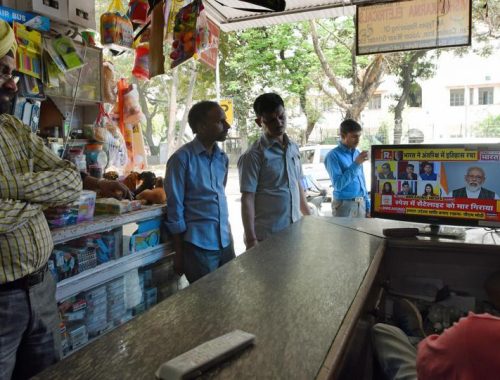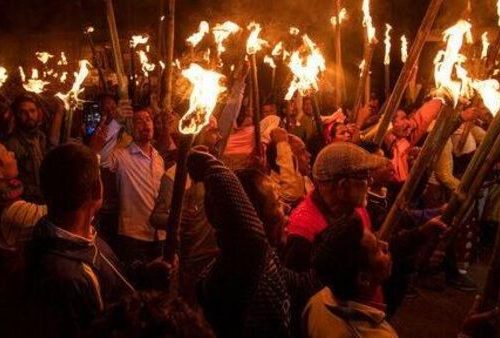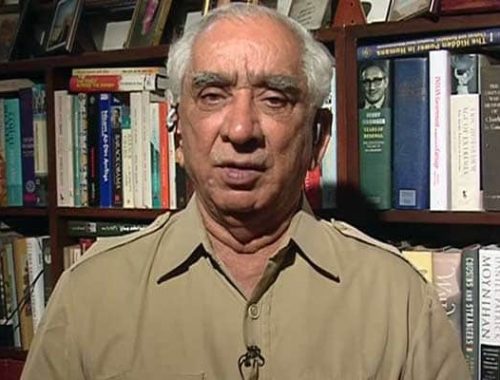Beijing protests over warm welcome shown to Taiwanese leader during her American stopover
Beijing protested to Washington on Monday over Taiwanese President Tsai Ing-wen’s tour of Nasa’s mission control complex during a stopover in the United States on the weekend.
Tsai became the first Taiwanese president to visit the Johnson Space Centre in Houston, Texas, on Sunday, touring a facility off limits to a series of leading space scientists from mainland China because of espionage fears.
She made the stop on her way back from a trip to Paraguay and Belize, two of the island’s shrinking number of diplomatic allies. It followed a high-profile visit to the Ronald Reagan Presidential Library in Los Angeles at the start of her trip a week earlier.
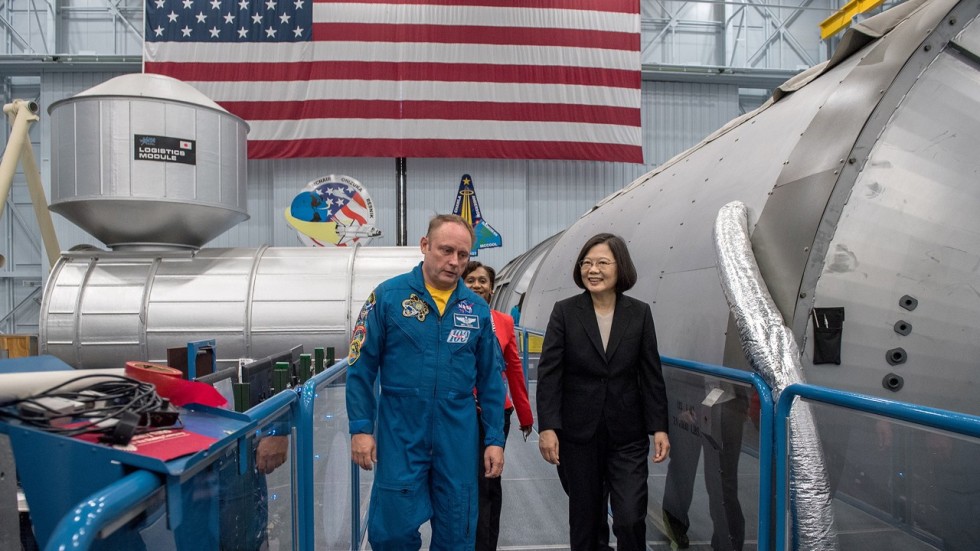
Astronaut Mike Finke with Taiwanese President Tsai Ing-wen
Chinese foreign ministry spokesman Lu Kang said Beijing had made “solemn representations” to various nations over the Taiwanese leader’s “separatist” moves in the international arena.
“China resolutely opposes any country with diplomatic ties with China, including the US, having official contacts with Taiwan,” Lu said.
US denies change to ‘one China’ policy after Taiwanese President Tsai Ing-wen’s speech in California
Analysts said the high level of courtesy shown to Tsai was a sign that Washington was willing to play the Taiwan card in dealings with Beijing.
Tsai told about 1,000 people who greeted her at hotel in Houston that her American stays were the strongest proof that relations between Taiwan and the US were at their warmest.
While in Los Angeles, Tsai made a public speech and met US officials and lawmakers, treatment that prompted protests from Beijing. In a break with the past, the media contingent travelling with her was also allowed to report on all of her public activities.
Washington had previously tried to avoid provoking Beijing by ensuring that transit stays by any Taiwanese leader were as low key as possible.
Tsai was expected to return to Taipei on Monday night.
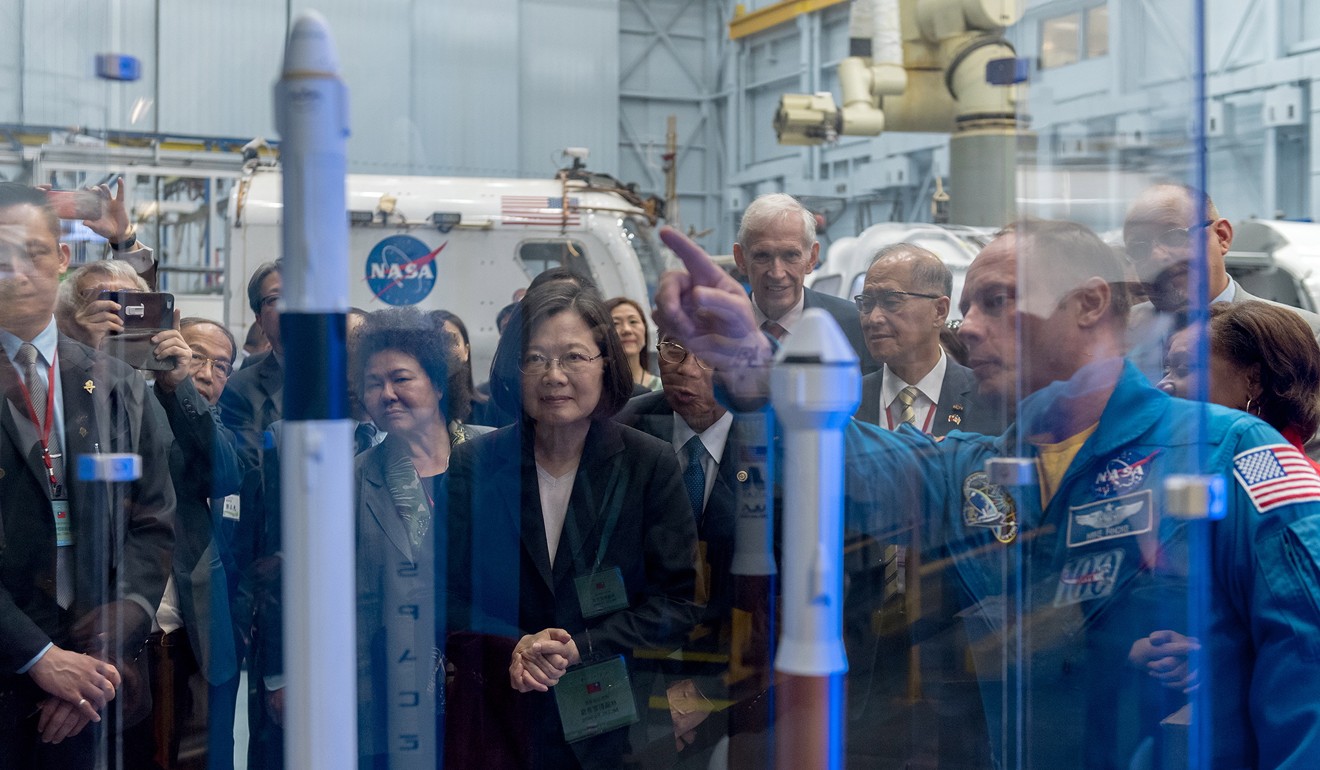
The US Congress passed a spending bill in 2011 that expressly forbids Nasa from working with Chinese authorities, citing a high risk of espionage.
Two years later, a group of Chinese scientists was excluded from attending a conference on Nasa’s Kepler space telescope programme.
In 2017, Yu Guobin, deputy director of China’s Lunar and Space Exploration Engineering Centre, was also denied a US visa to attend a gathering in The Woodlands, Texas, hosted by Brown University to discuss China’s plans to explore the moon and Mars.
Taiwanese President Tsai Ing-wen heads to Latin America to shore up diplomatic ties
The administration of US President Donald Trump has strengthened ties with the self-ruled island in the last two years, including encouraging official exchanges through the Taiwan Travel Act and promising military support to Taiwan.
Beijing, which considers Taiwan a breakaway province subject to eventual union if necessary by force, had warned Washington against allowing Tsai to enter the country, citing the US recognition of the “one China” policy.
Wang Kung-yi, a political-science professor at Chinese Culture University in Taipei, said the US administration had been careful to not provoke Beijing too much, given the stops were not in New York or Washington.
“[The trip is] a breakthrough compared with previous treatment for Taiwan’s leaders transiting in the US, but a Nasa tour does not necessary mean a significant breakthrough in US-Taiwan ties,” Wang said.
He said the Taiwanese president should be aware that the island long been a US card.
“Tsai should realise that the Trump administration is playing the Taiwan card against China in the face of a widening row between Washington and Beijing over trade and other major strategic interests,” Wang said.
Tao Wenzhao, a researcher at the Chinese Academy of Social Sciences in Beijing, said the transit arrangements for Tsai were a sign of better ties between Taipei and Washington but had not crossed Beijing’s red line by taking place in a major US city.
Cross-strait exchanges have been suspended since Tsai, of the pro-independence Democratic Progressive Party, became the island’s president in May 2016 and refused to acknowledge the “one China” principle, which Beijing considers essential for communication between the two sides.
Beijing has also staged military exercises near the island and put the squeeze on Taipei on the international stage, including wooing away four of Taiwan’s 22 allies in the last two years.

Additional reporting by Liu ZhenThis article appeared in the South China Morning Post print edition as: Beijing protests over Tsai visit to US space centre


